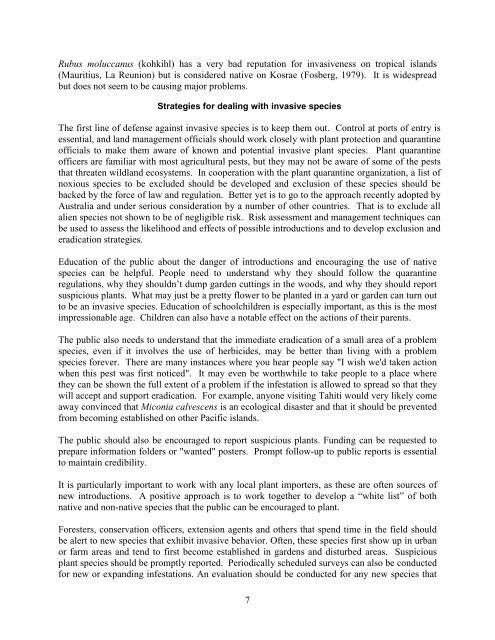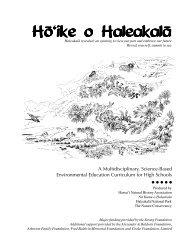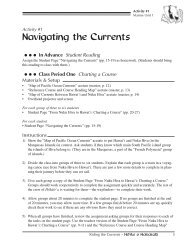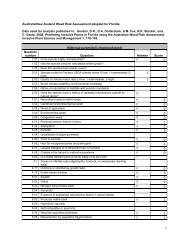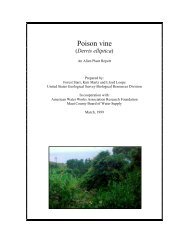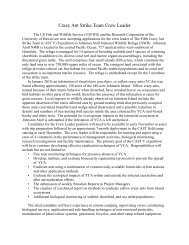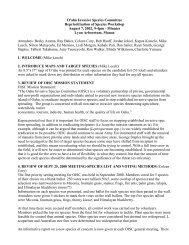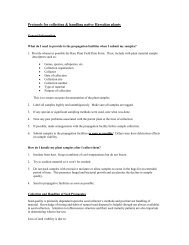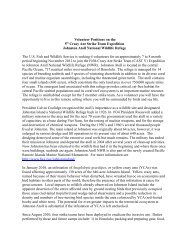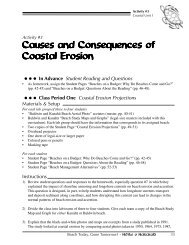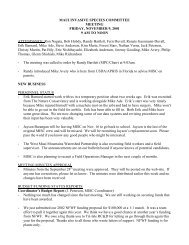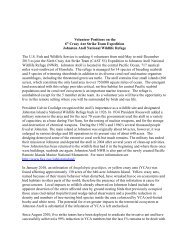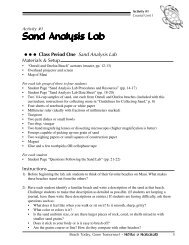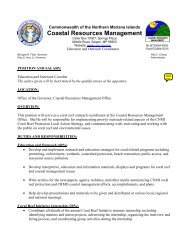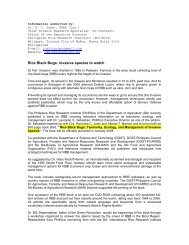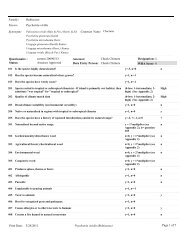Invasive plant species on Kosrae, Federated States of Micronesia
Invasive plant species on Kosrae, Federated States of Micronesia
Invasive plant species on Kosrae, Federated States of Micronesia
Create successful ePaper yourself
Turn your PDF publications into a flip-book with our unique Google optimized e-Paper software.
Rubus moluccanus (kohkihl) has a very bad reputati<strong>on</strong> for invasiveness <strong>on</strong> tropical islands<br />
(Mauritius, La Reuni<strong>on</strong>) but is c<strong>on</strong>sidered native <strong>on</strong> <strong>Kosrae</strong> (Fosberg, 1979). It is widespread<br />
but does not seem to be causing major problems.<br />
Strategies for dealing with invasive <str<strong>on</strong>g>species</str<strong>on</strong>g><br />
The first line <strong>of</strong> defense against invasive <str<strong>on</strong>g>species</str<strong>on</strong>g> is to keep them out. C<strong>on</strong>trol at ports <strong>of</strong> entry is<br />
essential, and land management <strong>of</strong>ficials should work closely with <str<strong>on</strong>g>plant</str<strong>on</strong>g> protecti<strong>on</strong> and quarantine<br />
<strong>of</strong>ficials to make them aware <strong>of</strong> known and potential invasive <str<strong>on</strong>g>plant</str<strong>on</strong>g> <str<strong>on</strong>g>species</str<strong>on</strong>g>. Plant quarantine<br />
<strong>of</strong>ficers are familiar with most agricultural pests, but they may not be aware <strong>of</strong> some <strong>of</strong> the pests<br />
that threaten wildland ecosystems. In cooperati<strong>on</strong> with the <str<strong>on</strong>g>plant</str<strong>on</strong>g> quarantine organizati<strong>on</strong>, a list <strong>of</strong><br />
noxious <str<strong>on</strong>g>species</str<strong>on</strong>g> to be excluded should be developed and exclusi<strong>on</strong> <strong>of</strong> these <str<strong>on</strong>g>species</str<strong>on</strong>g> should be<br />
backed by the force <strong>of</strong> law and regulati<strong>on</strong>. Better yet is to go to the approach recently adopted by<br />
Australia and under serious c<strong>on</strong>siderati<strong>on</strong> by a number <strong>of</strong> other countries. That is to exclude all<br />
alien <str<strong>on</strong>g>species</str<strong>on</strong>g> not shown to be <strong>of</strong> negligible risk. Risk assessment and management techniques can<br />
be used to assess the likelihood and effects <strong>of</strong> possible introducti<strong>on</strong>s and to develop exclusi<strong>on</strong> and<br />
eradicati<strong>on</strong> strategies.<br />
Educati<strong>on</strong> <strong>of</strong> the public about the danger <strong>of</strong> introducti<strong>on</strong>s and encouraging the use <strong>of</strong> native<br />
<str<strong>on</strong>g>species</str<strong>on</strong>g> can be helpful. People need to understand why they should follow the quarantine<br />
regulati<strong>on</strong>s, why they shouldn’t dump garden cuttings in the woods, and why they should report<br />
suspicious <str<strong>on</strong>g>plant</str<strong>on</strong>g>s. What may just be a pretty flower to be <str<strong>on</strong>g>plant</str<strong>on</strong>g>ed in a yard or garden can turn out<br />
to be an invasive <str<strong>on</strong>g>species</str<strong>on</strong>g>. Educati<strong>on</strong> <strong>of</strong> schoolchildren is especially important, as this is the most<br />
impressi<strong>on</strong>able age. Children can also have a notable effect <strong>on</strong> the acti<strong>on</strong>s <strong>of</strong> their parents.<br />
The public also needs to understand that the immediate eradicati<strong>on</strong> <strong>of</strong> a small area <strong>of</strong> a problem<br />
<str<strong>on</strong>g>species</str<strong>on</strong>g>, even if it involves the use <strong>of</strong> herbicides, may be better than living with a problem<br />
<str<strong>on</strong>g>species</str<strong>on</strong>g> forever. There are many instances where you hear people say "I wish we'd taken acti<strong>on</strong><br />
when this pest was first noticed". It may even be worthwhile to take people to a place where<br />
they can be shown the full extent <strong>of</strong> a problem if the infestati<strong>on</strong> is allowed to spread so that they<br />
will accept and support eradicati<strong>on</strong>. For example, any<strong>on</strong>e visiting Tahiti would very likely come<br />
away c<strong>on</strong>vinced that Mic<strong>on</strong>ia calvescens is an ecological disaster and that it should be prevented<br />
from becoming established <strong>on</strong> other Pacific islands.<br />
The public should also be encouraged to report suspicious <str<strong>on</strong>g>plant</str<strong>on</strong>g>s. Funding can be requested to<br />
prepare informati<strong>on</strong> folders or "wanted" posters. Prompt follow-up to public reports is essential<br />
to maintain credibility.<br />
It is particularly important to work with any local <str<strong>on</strong>g>plant</str<strong>on</strong>g> importers, as these are <strong>of</strong>ten sources <strong>of</strong><br />
new introducti<strong>on</strong>s. A positive approach is to work together to develop a “white list” <strong>of</strong> both<br />
native and n<strong>on</strong>-native <str<strong>on</strong>g>species</str<strong>on</strong>g> that the public can be encouraged to <str<strong>on</strong>g>plant</str<strong>on</strong>g>.<br />
Foresters, c<strong>on</strong>servati<strong>on</strong> <strong>of</strong>ficers, extensi<strong>on</strong> agents and others that spend time in the field should<br />
be alert to new <str<strong>on</strong>g>species</str<strong>on</strong>g> that exhibit invasive behavior. Often, these <str<strong>on</strong>g>species</str<strong>on</strong>g> first show up in urban<br />
or farm areas and tend to first become established in gardens and disturbed areas. Suspicious<br />
<str<strong>on</strong>g>plant</str<strong>on</strong>g> <str<strong>on</strong>g>species</str<strong>on</strong>g> should be promptly reported. Periodically scheduled surveys can also be c<strong>on</strong>ducted<br />
for new or expanding infestati<strong>on</strong>s. An evaluati<strong>on</strong> should be c<strong>on</strong>ducted for any new <str<strong>on</strong>g>species</str<strong>on</strong>g> that<br />
7


